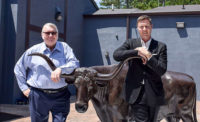Most butchers in the meat industry are expected to process any animal carcass that is placed in front of them. Whether it’s a cow, or pig, or goat or lamb or deer, they need to know how to get the best cuts, to the point that it becomes second nature. However, even the most experienced butcher may take a step back if asked to process something a little… toothier, and scalier, than a typical cow. Working on an alligator carcass is a whole different animal — literally.
Cordray’s, a Ravenel, S.C. establishment, has become a processor of choice during alligator season, which lasts from mid-September to mid-October in South Carolina. Owner Michael Cordray says that the company can process up to 120 alligators during the season, in addition to venison, wild hogs and, on a less exotic note, grass-fed beef from the family’s own farm.
Cordray learned the meat trade from his grandfathers, father and uncles, and he spent 20 years working as a meat salesman. He and his wife Claudia decided to start processing deer part-time to help pay for their children’s education. That business took off; Cordray’s now processes about 3,000 deer a year. One day, a hunter came to Cordray and asked to process his nuisance alligators, since his last processor had retired. That agreement led to a new market for the company.
“In 2008, we started with the public hunts in South Carolina. We went after that business pretty hard, because we had some experience with the nuisance alligators,” Cordray says. “We already had a good web presence because of the work my wife has done with the website, and we were able to get a good share of the alligators from the public hunt in South Carolina.”
From those gators, Cordray’s processes several offerings, including alligator jerky and sausages. A customer favorite is the tenderized fillet, where the meat is cut into bite-sized pieces, and those “frying bites” are then cubed for tenderness. Cordray says that he is always working on new ideas for alligator meat, including breakfast sausage links and smoked sausages.
“We’re always trying to experiment with it, and to expand the product line,” he says.
Additionally, Cordray’s offers an extensive range of taxidermy services. One of Cordray’s sons came back to the business as a taxidermy specialist, and the company can now offer everything from a head mount or a skull mount to a full-body mount. Alligator boots, belts and wallets are also available.
Cordray says that he has turned most of the alligator processing over to his son, but during the height of gator season, which coincides with deer season, everyone in the shop pitches in. At peak times, Cordray’s employs up to 30 people.
There is a learning curve involved in processing alligator.
“The muscle structure is different, the hide is incredibly tougher on an alligator than on the beef cattle,” Cordray says.
He adds that the company uses an air-powered dehider, but much of the work has to be done by hand.
“You really need somebody with some good boning skills. Then you have to learn the different muscles, to know what you want to use for trimming and sausage and what you want to use for the tenderized filets,” he explains.

















